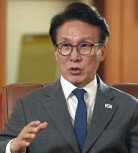Nuclear armament for S.Korea
Nuclear armament for S.Korea
Posted February. 11, 2012 05:21,
Zbigniew Brzezinski, former national security adviser under U.S. President Jimmy Carter, has mentioned the possibility of South Koreas nuclear armament in his latest book America and the Crisis of Global Power. He said the world is shifting from an era of the U.S. being the lone superpower to one of a new global order represented by the emergence of China and India. The decline of the U.S. will prompt a crisis of confidence over the U.S.-provided nuclear umbrella, he added. Brzezinski said certain countries including South Korea could be forced to seek nuclear weapons of ones own or from the extended deterrence of another power - most likely Russia, China or India. His argument is extraordinary as it was made in the U.S., which is leading non-proliferation activities.
When Chinese President Hu Jintao visited the U.S. in April 2002, many in Washington jokingly asked, Who is Hu? Though he would assume the position of the general secretary of the Communist Party seven months later and lead China for 10 years, the U.S. had no knowledge about him. The upcoming visit to the U.S. by Hu`s heir apparent Xi Jinping shows the changes in the status of the U.S. and China over the last decade. Washington found a photo of Xi`s father, a former governor of Guangdong province, visiting the U.S. 32 years ago and plans to offer it to Xi as a welcoming gift. U.S. Vice President Joe Biden plans to accompany Xi to a rural village in Iowa, which Xi visited in 1985. Brzezinskis theory of South Koreas nuclear armament is more than a simple projection, reflecting the decline of the U.S. and the rise of China.
Calls for Seouls nuclear armament have also made in South Korea. Ruling Saenuri Party Rep. Chung Mong-joon suggested the redeployment of tactical nuclear weapons to respond to North Koreas nuclear threat. Gary Samore, White House coordinator for arms control and weapons of mass destruction, proliferation and terrorism, drew attention by saying the U.S. will redeploy nuclear weapons to South Korea if Seoul requests it. Others argued that Seoul should develop its own nuclear weapons because of the impossibility of getting Pyongyang to give up its nuclear program.
If Seoul seeks nuclear armament, it will lose the cause with which to put pressure on Pyongyang to abandon its nuclear weapons. South Korea, however, could be in a situation in which it can no longer depend on the U.S. nuclear umbrella. South Korea also has to prepare for the global power shift predicted by Brzezinski. Which way should South Korea go in strengthening cooperation with China based on an alliance with the U.S., cooperating with China but focusing more on the alliance with the U.S., or striking a balance between the two superpowers?
Editorial Writer Bhang Hyeong-nam (hnbhang@donga.com)





![[천광암 칼럼]장동혁은 대체 왜 이럴까](https://dimg.donga.com/c/138/175/90/1/wps/NEWS/IMAGE/2026/02/22/133399127.1.jpg)

